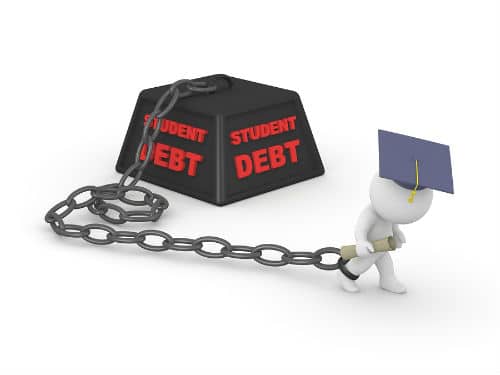Q: You’ve previously said that getting student loans discharged in bankruptcy court is nearly impossible.
I owe over $100,000 in student loans and have been in deferment for like 6 or 7 years.
Is it true that if you don’t make any payments they get discharged after 7 years?
I am very overwhelmed, stressed and need a realistic strategy to deal with my student loans. What are my chances of getting student loans discharged in bankruptcy court?
A: Thanks for reaching out to me, and I’m sorry to hear about how overwhelming your student loans have become.
The bottom line about student loan debts is that they are “generally” NOT able to be discharged in bankruptcy court. The main exception to that rule boils down to this: You’d have to convince a judge that you are in extreme dire straits – and will continue to be in an insurmountable financial condition in the future – for them to even consider it.
Unfortunately, there is no “standard” or “rule” about what qualifies. It’s totally up to each individual judge. And instances of student loans being discharged in bankruptcy court are done on a case-by-case basis through a bankruptcy attorney.
Common problems: going through divorce, being unemployed, having routine medical problems or excessive credit card debt, etc. — those situations simply don’t convince judges. They’ve seen and heard all those cases before. And during the recession, of course, people’s financial situations worsened. So it’s not like people didn’t try to get their student loan debts discharged in bankruptcy.
Frankly, I don’t personally know of a single student loan debtor who has been able to convince a judge to wipe out their student loans — and that goes for federal and private loans.
But just because I don’t know of people who have successfully rid themselves of student loans via bankruptcy doesn’t mean they don’t exist.
In fact, some studies have suggested that borrowers with federal and private loans (mainly low-income folks with chronic illnesses or ongoing, long-term medical problems) have indeed been able to get their student loans discharged in bankruptcy court, or at least reduced.
See more details on these cases, involving federal loans, here, and private student loans here. Research into these cases suggest that because so many people think it’s virtually impossible to get a bankruptcy discharge, individuals who might qualify don’t even seek bankruptcy court as an option to deal with their student loans.
Here’s what I can tell you, based on your current questions and your previous email to me: In your case, owing a large amount of debt (over $100,000) doesn’t qualify you for relief. Also, the fact that you never completed the degree is irrelevant from the law’s standpoint. That doesn’t qualify you for a bankruptcy discharge either.
Your best bet is to probably look into the possibility of having your student loans discharged due to disability. You said you’ve been out of work for years and have multiple health issues.
To get a student loan discharged due to disability, a physician has to certify that you are “totally and permanently disabled” and will likely never work again a day in your life. Again, they make the standard very, very high to let you even qualify for a disability discharge.
Here is more information on getting student loans discharged.
You Can Qualify For Student Loan Forgiveness If You Are Disabled
Do You Have To Pay Back A Student Loan If You Are Disabled
Now, what about your other question regarding discharging debts in bankruptcy after not paying them for a very long period of time: Is that possible? In a word: Yes.
Debt expert Steve Rhodes has written at length about why some people with private loans should just stop paying those debts. In a nutshell, Rhodes says there’s a statute of limitations on private loans and that after you haven’t paid for a while, and the statute of limitations expires, then you can fairly readily discharge those student loans in bankruptcy court, just like you can get rid of other consumer debts such as credit card bills.
Being in deferment for years, like you have, is one thing; but not paying student loans when you’re supposed to pay is another matter entirely. And needless to say, not paying your students loans until the statute of limitation expires – typically between 3 and 7 years – will wreak havoc on your credit rating, and expose you to potential lawsuits and court judgments.
But Rhodes’ idea – which is based on insights from California attorney Greg Fitzgerald of DebtProtectors.com – is worth a read for those truly desperate and burdened by student loan repayments.
Rhodes has also previously described a special subset of “private student loans that can be easily discharged in bankruptcy.” It’s valuable reading too.
I hope all this information helps and gives you a more realistic view of your options.








